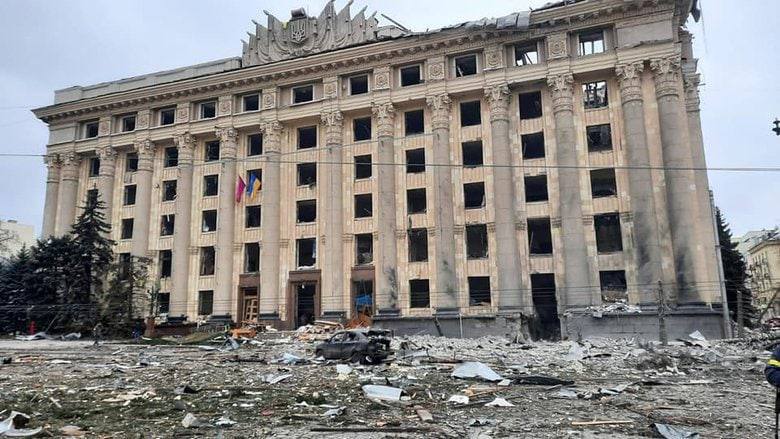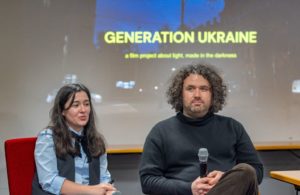
Statement by the International Association for Education and Exchange (IBB) on the first anniversary of the Russian army’s attack on Ukraine.
Since 24 February 2022, Ukraine has been defending itself with all its resources against the Russian attack. The war has disrupted the lives of millions of Ukrainians. At the same time, the war threatens the fundamental pillars of the European Union as a democratic peace project. Accordingly, the developments of the past year have not remained without consequences for our educational and youth work as International Association for Education and Exchange (IBB) and for that of our partners.
In the Generation Europe – The Academy programme, IBB e.V. coordinates a network of 45 youth work organisations from 14 European countries, which work in 15 project partnerships for the active participation of young people – in their respective places of residence and throughout Europe. The Deutsch-Ukrainische Gemeinschaft der Jugendarbeit (German-Ukrainian Association of Youth Work, DUGA) is also part of the network. When the activists of the partner organisation had to flee abroad from the war and Russian occupiers, their support became the first relief action of the network. Thanks to a grant from the Mercator Foundation, IBB e.V. is even able to employ Katia Henrikh, a DUGA activist, initially for one year as social media manager in the programme.
Generation Ukraine
One of Katia Henrikh’s major initiatives is the film project “Generation Ukraine”, which she is realising together with the Ukrainian production company Minimal Movie. For the filming, Katia travelled through Ukraine for several weeks in autumn 2022. The results are images of the everyday life of Ukrainian youths in the war, which they do not want to let take away their dreams of life and love. Katia’s aim with the film is to give the young generation in Ukraine a voice and to create a space for dialogue, peace and hope.

About light in times of darkness: Katia Henrikh (Generation Europe/IBB e.V.) and Roman Blazhan (Minimal Movie) present working material on the film project “Generation Ukraine”.
The project leaders from the partner organisations were able to see the first film clips at the Generation Europe network conference in Hattingen at the beginning of February 2023. Their exchange and discussion showed how much the war has changed youth work. On the one hand, the organisations involved often have to cope with additional humanitarian tasks so that basic supplies for Ukrainian war refugees can be guaranteed. On the other hand, the need for civic education and pedagogic activities on democracy has increased. Young people want to discuss the effects of the war on their lives and their own role as citizens – which is an extremely important task, given the public controversies throughout Europe about military support for Ukraine and the growing danger of disinformation campaigns in social media.
Multiple pressures
However, trying to meet both needs systematically overburdens youth work organisations – especially as they have not yet recovered from the stresses of the pandemic period. The funding rates have not yet been adjusted to the price increases, there is a lack of spaces for the young people and of further training opportunities for the professionals to be able to react to the new challenges with innovative methods. Youth work will only be able to fulfil the high expectations placed on it if politicians take note of these structural difficulties and make solutions possible.
Cooperation in times of war
Despite, or maybe because of, the multiple burdens, the experiences since the beginning of the Russian aggression have tended to strengthen ties within the European network of Generation Europe – The Academy. In contrast, the regional networks of historians and journalists from Eastern European countries that IBB gGmbH has built up in recent years have largely fallen apart. This is because direct cooperation between civil society actors, media professionals and researchers from Belarus, Russia and Ukraine is hardly possible at present in the face of the war – even if the Belarusian or Russian actors are themselves victims of political persecution in their countries and do not support the war. For this reason, IBB gGmbH offered its cooperation formats and training courses in 2022 mostly in separate country groups in order to take into account the different needs and not to deepen the traumatisation suffered, especially by the Ukrainian partners. At the same time, the IBB gGmbH team was constantly balancing on a tightrope, trying to preserve its own self-image as a link that remains available to look for new ways to initiate direct exchange at a later date.
In practice, this meant, for example, that in 2022 only history initiatives from Germany, Moldova, Poland and Ukraine worked together on digital projects. However, these exciting projects can all be viewed on the Digital History Platform, where projects from all long-standing partner countries, including Belarus and Russia, can still be found.
Changed formats and specific help
In terms of content, the work was also carried out on two tracks: Ukrainian history initiatives were concerned with researching local historical events from the Second World War on the one hand, but also with documenting the destruction of historical buildings in the war of the present. And for both journalists and historians, in addition to their professional work, practical commitment to the defence of their country and to supporting those directly affected by the war was always a priority, too. IBB gGmbH also tried to respond to the humanitarian needs within the scope of its possibilities: through psychological training and the provision of emergency pharmacies for journalists, by purchasing medicines for Chernobyl victims from the partner organisations of the Chernobyl History Workshop in Kharkiv, by donations for people with disabilities in Ukraine or through the commitment to Ukrainian refugees in Dortmund together with our partner Vita e.V.
As much as the war in Europe changes the demands on an NGO like IBB, one thing is certain: as a promoter of international education and exchange, we want to support the invaluable work of aid organisations, initiatives to help refugees and other civil society actors, but we cannot replace it. Our focus therefore remains on educational work to provide orientation in these difficult times, to strengthen civil society resilience and to initiate political changes that point the way out of war and confrontation in the long term. This also includes enhancing understanding of the interactions between the various multiple crises occurring today. Our new educational offers therefore also include talks and workshops on the impact of war on climate change and international climate protection.
Our photo above shows the Kharkiv Oblast Administration building destroyed by Russian attacks. This building is an important example of constructivism as an architectural style documented by the Ukrainian initiative ArtOborona as part of the Digital History Platform Extended project.
Please also read our statement of Feb. 24, 2022, “War Must Not Be an Instrument of Politics.”
